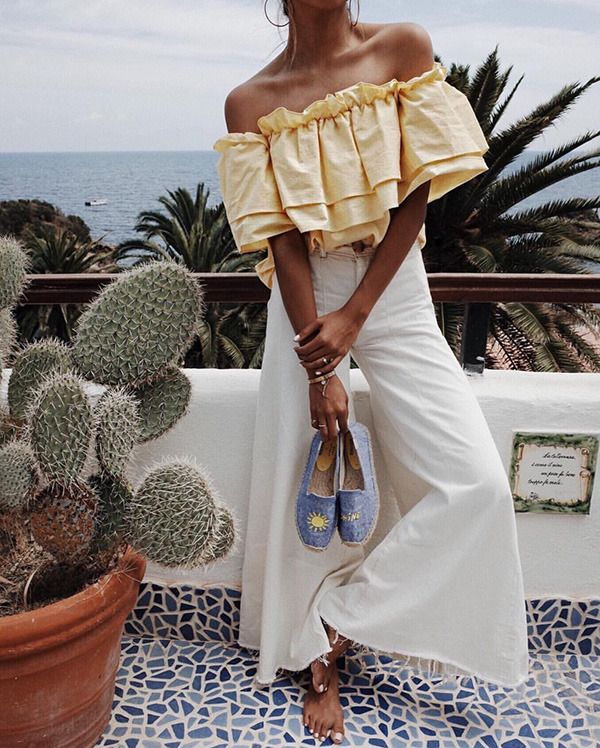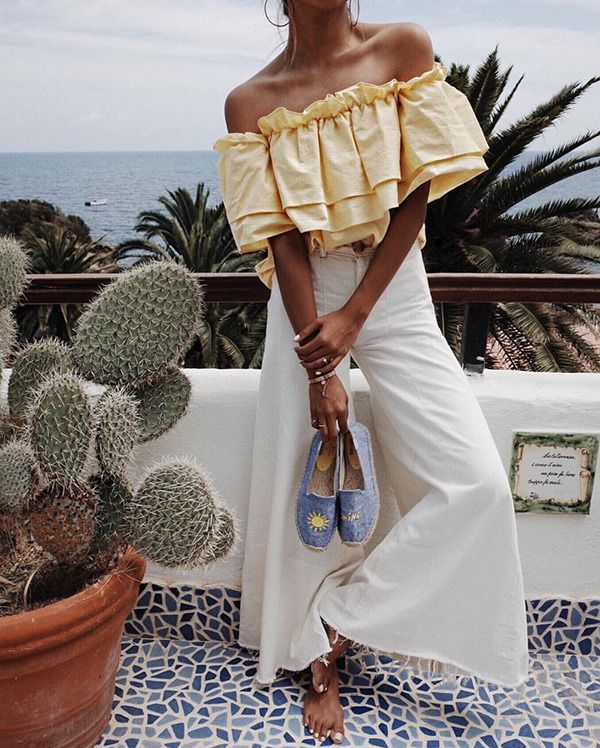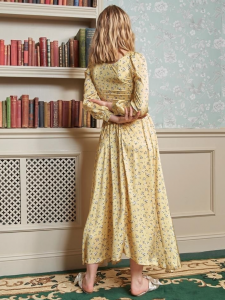“In everything, simplicity is the key to trusteeship. A simple life conserves not just our personal resources but the earth’s.” Eknath Easwaran
We all need things, including some clothes to wear and, if we’re lucky, some fun outfits to feel good in. And who doesn’t enjoy getting a new pair of shoes? It’s just fun and good for the spirit, especially at this time of year when those of us in the northeast are dying for some pastel colors, vitamins, and sunshine. Give me some pinks, yellows, and some rainbows.
But where things get tricky is when we create wants and needs around things we don’t need, like this season’s it bag, or the season’s new must have shirt. I know, I did it for years: cutting out pages from magazines at the beginning of every new season, circling items I thought I needed with a pen or tagging them with a post-it. What I ended up doing is buying is stuff I never even wore. And that’s pretty pathetic.
These days, for those of us who enjoy fashion, we have another issue which threatens our financial stability and our planet: instagrammers and influencers who constantly bombard us with images of fabulous outfits, different outfits, every single day as though this is realistic. The truth is that it’s not. A lot of the clothes are sponsored and, whether they are or not isn’t the point, the truth is that it isn’t sustainable.
Our oceans are suffering, our climate is adversely affected, and Mother Earth is inviting us to slow down by cutting back on this frenetic cycle of consumption. We’re being asked to embrace a gentler and simpler way of living. Who cares if you wear the same jeans four days per week? Does this have any incidence on your personal value or self-worth? Of course not.
I mean, do we really need another pair of jeans? We may think we do but the planet doesn’t. If you need proof of this, just watch the documentary River Blue about the disastrous effects blue jean manufacturing has on our planet. This will make you think twice about the idea of getting a new pair.
In addition to the immense benefits cutting down our consumption has on our planet, it’s my view that buying less, and getting rid of clutter, allows for greater spaciousness for us to receive greater abundance and flow.
It provides the breathing room necessary to think straight, be creative, have more time and connect with others. At the end of the day, being and feeling unencumbered by stuff is total freedom.
Spaciousness gives the mind the chance to wander, which is a very precious gift. This is the magical place where we receive hunches and insights. And if you’re creative, that special place of spaciousness is where you get and receive your most promising ideas.

So what do we do? How can we combine living a life of joyfulness, while dressing in a creative way that expresses who we truly are while also protecting the planet?
Here are some tips and tricks to help us manage our spontaneous urges, be creative, while protecting mama earth:
- Breathe: When you get the impulse to buy something, think twice, take a deep breath and exhale. We often buy things on impulse to avoid feeling negative emotions. I’ve done it many times. We all do it. But rather than run away from your emotions, feel into it, take a deep breath, and then release.
- Spend time in nature: Go for walk, hug a tree, dance in the rain, go pick up trash, and see if the desire passes. It may sound simplistic, but it works. Nature fills us up in ways that stuff cannot. And when you spend enough time in nature, you’ll be ultra-vigilant and concerned about protecting it.
- Avoid Shopping malls. Author and Spiritual teacher Eknath Easwaran in his book, Discovering your Hidden Spiritual Resources says that spending time in shopping malls creates urges within us to buy things we don’t need. According to him, when we go shopping in malls, we lose some vital energy through the eyes, as they are drawn to countless things. I now avoid going to malls as much as possible as they no longer hold any appeal. I rarely visit them unless there’s something specific I need. If that’s the case, I just focus on getting that one item, then leave.
- Meditate. Meditation allows us to calm down the mind, regulate our emotions, stop the compulsive behaviour and our many manic impulses. Meditation allows our unquenched desires to evaporate quickly. If you mediate once or twice a day, even for a few minutes, this will have a big impact.
- Buy second hand. I have been buying things from second hand and thrift shops and getting a thrill out of finding such jewels. It is a true pleasure and I love the thrill of the hunt. You’re basically slowing down the cycle of trash and pollution. Interesting fact: the second hand market is set to surpass the fast fashion market in the next five to ten years.
- Just keep driving or surfing. See your favourite outlet from the highway? Don’t get off the exit ramp. Spot a store opening on your way home from work? Keep driving. You get invited to store invitations? Delete the e-mail. See something you like online? Leave the site and keep surfing, preferably to sites that promote the environment. Most often we’re just acting out of compulsion. It too shall pass.
- Donate to a special cause. If you feel compelled to buy something ( either for yourself or as a gift), why not buy an item connected to a cause that is near and dear to your heart? For example, 4Ocean sells bracelets that help remove trash from the ocean one pound at a time.
- Shop your closet. My final suggestion is to appreciate what you already have, try to mix and match, play with colors and patterns, and try different accessories to update your look. You’ll be amazed with what you come up with once you use a bit of creativity. This is where fashion blogs and Instagram accounts are great tool to help you spice up your outfit. You’ll be proud of what you came up with!

“The fact that nothing on earth belongs to us personally has far reaching implications. All of which come down to a simpler life; simpler in its externals, and so gentler on the earth but gentler too in our inner lives , where desires are fewer but immeasurably richer and more productive.” Eknath Easwaran






